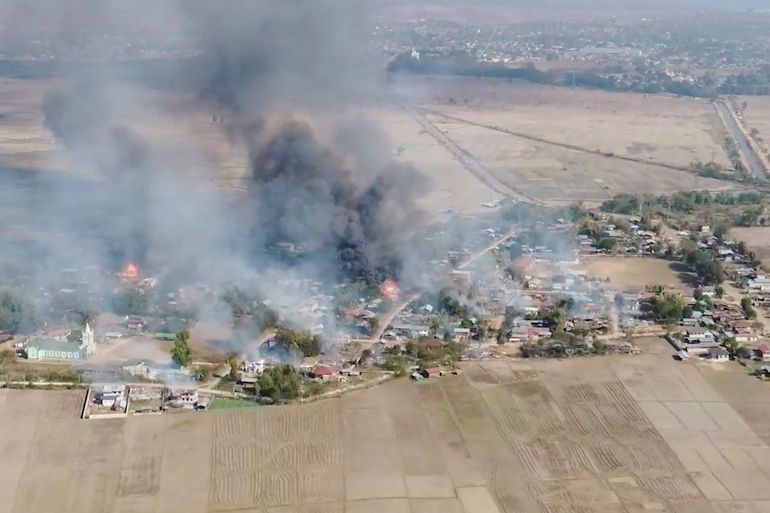US, UK, Canada sanctions target Myanmar air force, ‘arms dealers’
New sanctions imposed as generals who seized power in February 2021 coup continue assault on civilians.

The United States, the United Kingdom and Canada have imposed coordinated new sanctions on Myanmar, focusing on senior military officials, including the newly-appointed chief of the air force and those linked to the arms trade in response to the military’s brutal crackdown on opponents to its rule.
The US sanctions target three alleged Myanmar arms dealers as well as the companies linked to them, and two businesses controlled by sanctioned arms dealer Tay Zaw.
Keep reading
list of 4 itemsRohingya in Bangladesh welcome US calling repression genocide
‘They carry me on their backs and run’
ASEAN envoy meets generals in controversial Myanmar visit
The US also imposed measures against the 66th Light Infantry Division, an army unit blamed for burning some 30 civilians alive in their cars in southeastern Kayah state on Christmas Eve last year.
“We have taken these actions today in response to the regime’s escalating violence, to show our strong support for the people of Burma, and to promote accountability in connection with the coup and the violence perpetrated by the regime,” US Secretary of State Antony Blinken said in a statement. “We will continue to impose costs on the military regime and those who support it until it ceases the violence and restores Burma’s path to democracy.”
The UK took action against arms dealers and companies with a focus on those sourcing and supplying weapons to the air force, which has engaged in the bombing of civilian villages, forcing tens of thousands from their homes.
Those pinpointed include air force chief General Htun Aung who is also a director of Myanmar Economic Holdings Ltd (MEHL), a significant military conglomerate.
“The Myanmar military has shown no signs of stopping its brutal campaign of violence against the people of Myanmar, who continue in their fight for democracy,” UK Minister for Asia Amanda Milling said in a statement. “These sanctions target those who are instrumental in supplying the military with weapons that facilitate these abuses across the country. Working with like-minded countries, the UK will always defend the right to freedom, democracy, rule of law and hold to account this suppressive, brutal regime.”
Canada, meanwhile, added four individuals – including Htun Aung – and two companies to its blacklist.
Since seizing power from Myanmar’s elected government on February 1, 2021, and detaining civilian leader Aung San Suu Kyi, the generals have waged a brutal campaign against those opposed to its rule, targeting peaceful protesters as well as civilians. More than 1,700 people have been killed in the crackdown, according to the Assistance Association for Political Prisoners, which has been monitoring the situation, and thousands were forced from their homes as a result of aerial bombardment.
“Stopping Burmese military airstrikes is the most urgent priority, and it is very good to see the British government begin the process of targeting suppliers to the air force,” Mark Farmaner, director of Burma Campaign UK, said in a statement, noting that air attacks were taking place almost every day.
Earlier this month, in its first detailed assessment of the situation, the United Nations accused the military of committing war crimes, including torture and indiscriminate killings of civilians in its attempts to put down opposition to its rule.
A report on Thursday from Fortify Rights and the Schell Center said the army and police were under instructions to deliberately fire at civilians. It recommended 61 senior military officials be investigated for ‘crimes against humanity’.
The new sanctions come the same week that the US announced that it had determined the 2017 crackdown on the predominantly Muslim Rohingya, which sent some 750,000 people across the border to Bangladesh, was a genocide.
Rohingya campaigners also welcomed the new measures and urged countries to further expand the sanctions.
“Cutting sources of revenue and arms to the military is essential, so these new sanctions are very welcome,” Tun Khin, president of Burmese Rohingya Organisation UK, said in an emailed statement. “The USA, UK and Canada have the right strategy in sanctioning the military and its allies but the sanctions are coming too slowly. They need to increase the pace of sanctions and expand the scope to include gas revenue and aviation fuel.”